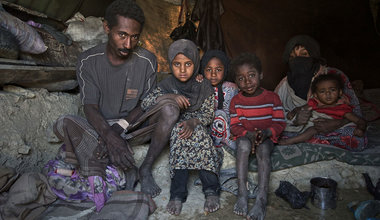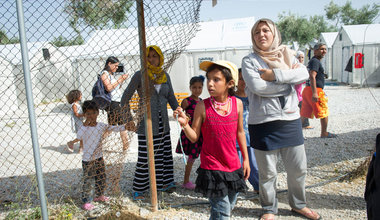European leaders at General Assembly stress UN’s vital importance in resolving global crises
 European leaders mounted the rostrum of the United Nations General Assembly today to spotlight the vital importance of the world Organization in resolving global crises from climate change and sustainable development to conflicts and refugees and migrants.
European leaders mounted the rostrum of the United Nations General Assembly today to spotlight the vital importance of the world Organization in resolving global crises from climate change and sustainable development to conflicts and refugees and migrants.
“Our goal for the United Nations must be the construction, day after day, of an efficient Organization in the service of the common interests of its Member States,” Belgian Prime Minister Charles Michel told the Assembly’s 72nd annual general debate.
“When regional actors and the United Nations are on the same page and work together, great things can be achieved,” he said, noting that globalization has generated fears and doubts in which even the very essence of the UN is sometimes questioned.
He cited the recent spate of catastrophic hurricanes and other environmental disasters as a clarion call for urgent action.
“It’s no longer a question of putting off to tomorrow what we must do today,” he declared. “Doubt is no longer permissible. For numerous countries, especially the island States of the Pacific, the Indian Ocean and the Caribbean, these natural phenomena have an immediate impact for their survival.”
For his part, Moldovan Prime Minister Pavel Filip stressed that the UN has the primary responsibility for the maintenance of peace and security.
“I am confident that with his competent leadership and the joint efforts of the Member States, we will succeed in redefining the role of the United Nations and adjusting it to the requirements of the modern world,” he said.
“Today, more than ever, we need a joint commitment of all UN Member States to face those challenges,” he added, citing armed conflicts in the Middle East, terrorism, poverty, the excessive accumulation of conventional weapons and the development of nuclear programmes.
“An international environment marked by the threats to use force, including nuclear arms, greatly exacerbates the sense of insecurity and lack of trust,” he said, also noting that devastating natural disasters occurring with increasing frequency in a warming world
affect hundreds of millions of people.
Maltese Prime Minister Joseph Muscat stressed the importance of Agenda 2030, the UN Sustainable Development Goals (SDGs), which seek to eliminate a host of social ills, from hunger and poverty to the lack of access to education and health care.
“Challenging times require us to be on time for the challenge. That time is now, sooner rather than later. Purposeful and systematic action by multi-stakeholders, at all levels and across all strata is crucial if the ensuing benefits are to be felt by the people in all corners of the world,” he said.
“The UN is the prime mobilizer and anchor of international peace, security and stability [and] has a quintessential role to play, if we are to secure a peaceful, sustainable and a better world for all, he continued, adding: “We are strong believers in the overarching power of multilateralism. We do not believe the UN is simply a sum of its parts, but rather a force that grows exponentially when we think and act as one, rather than alone.”
San Marino’s Foreign Minister Nicola Renzi noted that the complexity of the challenges facing the UN today is unparalleled in its history.
“The interconnected nature of the challenges reminds us that countries must act together to be more effective in the fight against climate change, global terrorism, poverty and to build more inclusive, safe and just societies for all,” he said.
“The United Nations must adapt quickly to the new global challenges, but also to the new
opportunities offered by an increasingly interconnected world, in order to be more effective
in carrying out its mandate.
“Therefore, reforms are crucial to future world stability and maintenance of international
peace and security, and must remain at the centre of our actions. We reject any downsizing
of the role of the United Nations due to the impossibility of finding a common agreement
on the reforms needed to improve its functioning.”
Also addressing the high-level debate, Liechtenstein Foreign Minister Aurelia Frick called on all Member States to expand the authority of International Criminal Court set up 20 years ago to judge cases of genocide, crimes against humanity and war crimes to include illegal use of force.
“Today we often manage and contain armed conflict rather than preventing it in the first place. We must do better. This year we have the opportunity to make a historic step forward. For the first time since the creation of the United Nations, we can give an international
tribunal jurisdiction over the crime of aggression,” she said.
“The most serious forms of the illegal use of force will be punishable. The tribunal in charge will be the International Criminal Court, the centrepiece of our common fight for accountability. I appeal to all of you today: Live up to the commitment we have made when signing on to the UN Charter.
“Let us enforce the prohibition of the illegal use of force by making it punishable in the highest court of criminal law that we have,” she underscored.
For his part, Antoni Marti Petit, Prime Minister of Andorra, describing his country as a “faithful defender of the multilateral order,” called for effective cooperation to address global challenges. No country, no matter how powerful, could handle today’s challenges alone. Meeting development goals required the recognition of the nexus between peace and development.
To that end, development goals would never be met if climate change went ignored. Catastrophic climate events affected all nations, he said, noting that Andorra is prioritizing the development of renewable energy, production of electric vehicles and finding more effective ways to heat households.
On other issues, he said mutual respect would lead to a more peaceful world, he assured. The link between peace, human rights and inclusive development could not be ignored. Because of that, Andorra would support the International Criminal Court’s capacity to act as a matter of course in the most serious issues without the need for Security Council intervention. He also called for limiting veto powers within the Council when dealing with cases of mass atrocities. He insisted “inclusive multilateralism” had to be the guiding principle of all Member States.
 ONU
ONU











